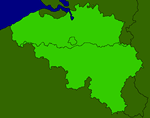Why is Flanders not bankrupt?

Today was an historic day.
I’ve been to the Flemish part of Belgium on a number of occasions, and I’ve visited a few of the main towns.
And until today on every occasion something has been happening that made the local transport free.
When I visited Bruges in 2004 the bus from the station was free because there was an exhibition going on in town.
When I visited Antwerp in 2006 they were celebrating the opening of an extension to the pre-metro and all the travel for the whole weekend was free.
When I went to Ghent from Antwerp I discovered that the celebrations appeared to be across Flanders as all of Ghent’s public transport was free.
Yesterday, I, lazily, caught a bus from the centre of town to the station and, because it was the last Sunday before Christmas, all the buses were free.
Finally, today, on the costal tram I had to buy a ticket for the day, a whole €5, the first time I had actually had to pay to be transported on a De Lijn service (it should be noted that I have never experienced free travel on TEC services in Walloon or the MIVB/STIB services in Brussels).
Which leads me to the question, with this amount of free public transport sloshing around – even being given to the tourists, why is Flanders still the rich part of the country and not facing imminent bankruptcy
I’ve been to the Flemish part of Belgium on a number of occasions, and I’ve visited a few of the main towns.
And until today on every occasion something has been happening that made the local transport free.
When I visited Bruges in 2004 the bus from the station was free because there was an exhibition going on in town.
When I visited Antwerp in 2006 they were celebrating the opening of an extension to the pre-metro and all the travel for the whole weekend was free.
When I went to Ghent from Antwerp I discovered that the celebrations appeared to be across Flanders as all of Ghent’s public transport was free.
Yesterday, I, lazily, caught a bus from the centre of town to the station and, because it was the last Sunday before Christmas, all the buses were free.
Finally, today, on the costal tram I had to buy a ticket for the day, a whole €5, the first time I had actually had to pay to be transported on a De Lijn service (it should be noted that I have never experienced free travel on TEC services in Walloon or the MIVB/STIB services in Brussels).
Which leads me to the question, with this amount of free public transport sloshing around – even being given to the tourists, why is Flanders still the rich part of the country and not facing imminent bankruptcy
Labels: Belgium, Flanders, Money, Public Transport, Wallonia

